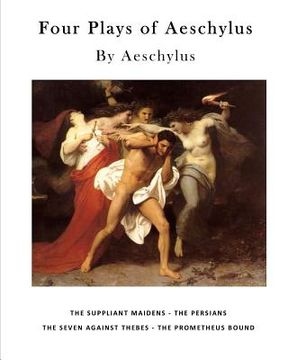Reseña del libro "Four Plays of Aeschylus (en Inglés)"
Four Plays of AeschylusBy AeschylusContentsTHE SUPPLIANT MAIDENSTHE PERSIANSTHE SEVEN AGAINST THEBESTHE PROMETHEUS BOUNDAeschylus (c. 525/524 - c. 456/455 BC) was an ancient Greek tragedian. He is also the first whose plays still survive; the others are Sophocles and Euripides. He is often described as the father of tragedy: critics and scholars' knowledge of the genre begins with his work, and understanding of earlier tragedies is largely based on inferences from his surviving plays. According to Aristotle, he expanded the number of characters in theater to allow conflict among them, whereas characters previously had interacted only with the chorus.Only seven of his estimated seventy to ninety plays have survived, and there is a longstanding debate regarding his authorship of one of these plays, Prometheus Bound, which some believe his son Euphorion actually wrote. Fragments of some other plays have survived in quotes and more continue to be discovered on Egyptian papyrus, often giving us surprising insights into his work. He was probably the first dramatist to present plays as a trilogy; his Oresteia is the only ancient example of the form to have survived.The surviving dramas of Aeschylus are seven in number, though he is believed to have written nearly a hundred during his life of sixty-nine years, from 525 B.C. to 456 B.C. That he fought at Marathon in 490, and at Salamis in 480 B.C. is a strongly accredited tradition, rendered almost certain by the vivid references to both battles in his play of The Persians, which was produced in 472. But his earliest extant play was, probably, not The Persians but The Suppliant Maidens--a mythical drama, the fame of which has been largely eclipsed by the historic interest of The Persians, and is undoubtedly the least known and least regarded of the seven. Its topic--the flight of the daughters of Danaus from Egypt to Argos, in order to escape from a forced bridal with their first-cousins, the sons of Aegyptus--is legendary, and the lyric element predominates in the play as a whole. We must keep ourselves reminded that the ancient Athenian custom of presenting dramas in Trilogies --that is, in three consecutive plays dealing with different stages of one legend--was probably not uniform: it survives, for us, in one instance only, viz. the Orestean Trilogy, comprising the Agamemnon, the Libation-Bearers, and the Eumenides, or Furies. This Trilogy is the masterpiece of the Aeschylean Drama: the four remaining plays of the poet, which are translated in this volume, are all fragments of lost Trilogies--that is to say, the plays are complete as poems, but in regard to the poet's larger design they are fragments; they once had predecessors, or sequels, of which only a few words, or lines, or short paragraphs, survive. THE SUPPLIANT MAIDENSARGUMENTIo, the daughter of Inachus, King of Argos, was beloved of Zeus. But Hera was jealous of that love, and by her ill will was Io given over to frenzy, and her body took the semblance of a heifer: and Argus, a many-eyed herdsman, was set by Hera to watch Io whithersoever she strayed. Yet, in despite of Argus, did Zeus draw nigh unto her in the shape of a bull. And by the will of Zeus and the craft of Hermes was Argus slain. Then Io was driven over far lands and seas by her madness, and came at length to the land of Egypt. There was she restored to herself by a touch of the hand of Zeus, and bare a child called Epaphus. And from Epaphus sprang Libya, and from Libya, Belus; and from Belus, Aegyptus and Danaus. And the sons of Aegyptus willed to take the daughters of Danaus in marriage.......

